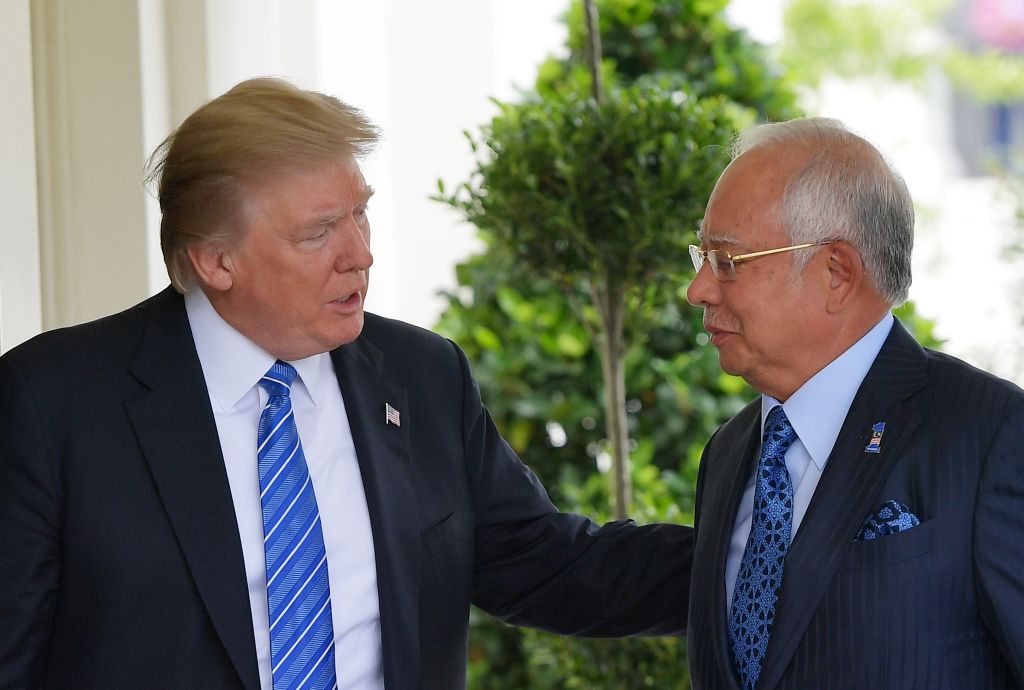Najib needs to keep the US happy
Malaysian Prime Minister Najib Razak has many reasons to stay on President Donald Trump's good side.
The United States is a long-time strategic ally of Malaysia, and Asean in general, providing a counterweight to China's influence in the region.
America is also an important trade partner of our neighbours to the north.
According to the US Census, Malaysia exported US$36.6 billion worth of goods to the US in 2016.
If that wasn't enough, Najib himself is currently under investigation by the US Department of Justice for his connection to the 1MDB scandal, where an estimated US$1 billion dollars in assets were allegedly embezzled.
Trying to be friends
With all that in mind, Najib went on the charm offensive during his state visit to the US in September 2017.
He came prepared with promises calculated to please the money-minded Trump, including future purchase orders for 25 Boeing aircraft and a proposed US$4 billion investment in Trump's plans for infrastructure development.
"“Great,” Mr. Trump interjected, each time Mr. Najib reeled off a figure."
Once he returned home, Najib was quick to hail the success of his trip as a reflection of his own global stature.
"I am very happy to be received in this manner by US President Donald Trump as not only a prime minister but as a friend."
[related_story]
A controversial announcement
Despite Trump's meetings with Muslim leaders, such as Najib and Crown Prince Mohammad bin Salman of Saudi Arabia, Trump had no qualms provoking countries with substantial Muslim populations.
On Dec. 6, Trump announced that the US would formally recognise the city of Jerusalem as Israel's capital.
Israel's description of the city, as its "eternal and undivided" capital, is seen as a major stumbling block in the Israel-Palestine peace process.
Palestinians want East Jerusalem to be the capital of a future independent state.
Although this move fulfilled one of his election campaign promises in 2016, it was also a move that upended 70 years of US foreign policy.
Predictably, it has also led to unrest among the Palestinians and drew condemnation from around the world, including erstwhile US allies Saudi Arabia, the U.K. and France.
Hamas just called for a new intifada https://t.co/Ycpej2iM84
— The Independent (@Independent) December 7, 2017
Joining the crowd
On Dec. 7, Najib joined the wave of opposition against the US, despite his earlier attempts to court President Trump.
During the UMNO general assembly meeting, Najib said:
"We must voice our stand clearly so that the world listens to the voice of the Muslims in Malaysia, that we reject forever and in the harshest terms the suggestion to make Baitul Maqdis (Jerusalem) as the capital of Israel."
Earlier on Dec. 7, Malaysia's Foreign Ministry made a public statement criticising Trump's move, saying that it threatened peace and stability in the region and it would make fighting terrorism more difficult. It added:
"It is also an infringement on the Palestinian people's national rights, including their right to self-determination, and a grave breach of international law along with the Security Council's relevant resolutions."
Najib's move matched popular sentiment within Malaysia, where Trump's announcement was highly unpopular. Hundreds marched in the streets of Kuala Lumpur in protest.
"Down to USA President's Trump." Hundreds in the streets of KL to protest #Jerusalem decision. pic.twitter.com/zZKAb799oq
— Sumisha Naidu (@sumishanaidu) December 8, 2017
[related_story]
Everything's political
With public sentiment inflamed, Najib has capitalised on Trump's announcement.
With the general election to be called by August 2018, and with seasoned challengers like former PM Mahathir Mohamad and former Deputy PM Anwar Ibrahim leading the opposition, Najib knows that every move made now will have significant consequences come election day.
And Najib's not the only politician willing to take a tough stand on Israel in front of a domestic audience.
On Dec. 9, Malaysia's Defence Minister and UMNO vice-president Hishammuddin Hussein said:
"The armed forces are on standby and will await any signal or command from the leadership to contribute in an appropriate role."
At face value, that might be a chilling statement -- no one wants an actual war to break out.
But in the context of a politician addressing his party ahead of a contentious general election, it does seem like Malaysia's leadership senses which way the wind is blowing.
Regardless of what Najib thinks of Jerusalem's new status, he might have had no choice but to oppose Trump -- although this will certainly put a dampener on any warm relations they might have built so far.
Top image via Mandel Ngan/AFP/Getty Images
If you like what you read, follow us on Facebook, Instagram, Twitter and Telegram to get the latest updates.
